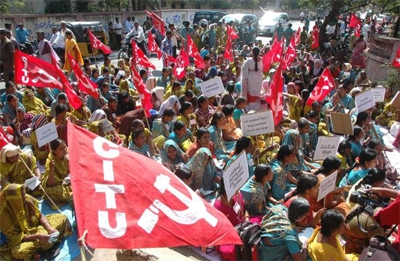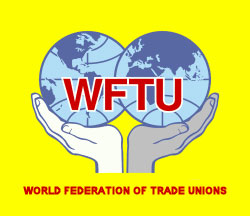It is hundred and four years since the International Women’s Day is being observed all over the world. The day, which used to be the day of working women, has now become International Women’s day, focusing on the demands of women as a whole.
It is also to be noted that, as on other occasions nowadays, this day of struggle is being commercially exploited by vested interests. This, at the same time, is also utilised to divert the attention from the realities – the class exploitation and oppression being perpetrated against women.
The call for the observance of the day internationally had come from Clara Zetkin, a well known Socialist leader from Germany. It was aimed at focusing the contributions of women and also as an occasion to press the demands of women. It was sought to be an opportunity for women workers and other women to strengthen the struggle against the exploitative system in existence and to move towards a progressive, socialist society!
It is to be noted that initially March 19 was decided as the date for holding the first International Women’s Day. This day was chosen as it was on this day in 1848 that intense working class struggles broke out in Prussia forcing the King to agree in principle, to universal suffrageWomen’s Day on 19th March 2011 received tremendous response from women in several countries in Europe. The day was observed demanding `women’s right to work, to equal wages, to vote, to hold public office and to end other forms of discrimination. In 1913, the observation of International Women’s Day was shifted to March 8, the day when women garment workers in New York went on strike in 1857.
It is interesting that the Russian Revolution too started off with huge demonstrations on International Women’s Day on 1917 with thousands of working class women marching in the cold snow covered streets of St Petersburg demanding bread for their hungry children and the return of their men from the War.
If we look into the demands raised on the occasion of International Women’s Day in 1911 and the demands being raised by women today, we can see that the situation has not changed much. Even more than a hundred years later, in 2014, the demands are almost the same as in 1911.
CITU and Women Workers
CITU can be proud of the fact that it was the first among the central trade unions, to organise a national level Working Women’s Convention in April 1979 and to form an All India Co-ordination Committee of Working Women (AICCWW). This sub-committee of CITU was formed, fully understanding the necessity of taking a new initiative to correct the imbalance in the trade union movement and also rectify many prejudices that existed.
Explaining the background of formation of AICCWW, founder President of CITU, Com. B.T. Ranadive said – ‘The CITU had to take the decision to call a special conference because it was found that the grievances of working women were unattended; the government was indifferent; the employers were hostile; and even the trade unions were not very enthusiastic about their demands. In the so many strikes that the working class fought there were very few instances when the special demands of the working women were given prominence.
It was also found that women, even in industries and occupations where they formed a sizeable section were hardly represented in the leading bodies of the union.
This state of affairs was partly due to the disabilities, which women suffer from in a society like the Indian society. The inferior status assigned to women in both Hindu & Muslim communities is known to all. That discrimination doggedly pursues the working women and it is the elementary duty of the trade unions to fight against it. We cannot say that our workers and some of our trade union leaders are free from this discriminatory outlook towards women.’ (Presidential Address – 4th All India Conference of CITU)
It is gratifying now to find that many of the Central Trade Unions in the country and also various independent national federations have formed working women’s committees. Various problems of working women at their place of work and other issues have come to the fore during this period.
Another achievement during this period has been unionisation of large number of women workers in various sectors – unorganised, organised and large chunk of exploited working women in various schemes of the central and state governments. Militant struggles have been conducted by these women workers who were able to snatch some gains from the unwilling hands of the government and employers.
Miles to go
CITU is also proud of the fact it could mobilise lakhs of women workers under its banner, conduct struggles and develop a good number of women workers as active cadres and leaders of the organisation.
But, CITU is also aware the limitations of the gains achieved and that is has miles and miles to go to achieve its aims and objectives outlined on various occasions from 1979.
The 14th All India Conference in April 2013 and the 10th All India Convention of AICCW in September - October 2013 critically analysed the achievements and also the tasks ahead. Several short comings that need to be overcome urgently have been noted.
On the whole, the involvement and the guiding role of CITU committees at various levels need further strengthening. Issues of working women need to be on the top of the agendas for unions and federations in which there are women workers in considerable numbers.
It was with this aim a national workshop involving central and state leaderships of CITU and the members of AICCWW was held a few days ahead of the International Women’s Day, where serious discussions were held and decisions taken as called upon by the All India Conference of CITU.
CITU expects that these decisions will pave the way for strengthening the women workers initiatives, their improved involvement in trade union activities and moving further up on the ladder to leadership positions in the unions and committees.
AICCWW will also be working with working women’s sub-committees of fraternal organisations in strengthening the class oriented functioning among women workers.
8th March 2014
CITU has called upon all its affiliates to organise meetings, demonstrations, dharnas, deputations etc on the occasion of International Women’s Day this year, focusing on some important demands. It has called upon all its committees and affiliated unions to ensure that these observations involve both men and women in large numbers. The issues being raised can not be considered as women’s issues alone and unless these are not addressed, the entire society and working class in particular will continue to suffer.
Equality in all aspects
One of the issues to be focused is equality in all aspects. This issue is not confined to equal wages for equal work, though it is a very important demand of women workers. Equal status to women is today being denied in every aspect of life. Discrimination begins from the birth of a girl child and goes on in education, employment, wages, promotion opportunities, social life and in the political sphere.
As far as wages are concerned a recent study on Gender Pay Gap in formal sector 2006-13 gives an idea about the Indian situation. “According to the report the gender gap in India in 2013 increased with age, higher education and qualifications. Women with education of below 10th class earned 9.37% less than men while women with professional qualification like CA/CS/ICWA or equivalent earn 44.25% less than men! Women with work experience of 16 to 30 years earned 24.96% less than men whereas women with work experience of 31 years or more earned 78.23% less than men!”
If this is the situation in the formal sector, the situation in informal sector is worse. “According to the data provided by the Labour Bureau in April 2013, the gap between the wages of men and women in some activities has widened in the last decade. The data show that while men were paid Rs.212 a day for ploughing women were paid Rs.123; for sowing men were paid Rs.185 and women Rs.148; for harvesting the wages were Rs.179 for men and Rs.149 for women. The wages paid for well digging for men were Rs.254 whereas they were a mere Rs.145 for women. In case of unskilled non agricultural work the wages were Rs.179 for men and Rs.135 for women.” (Documents of 10th Convention of AICCWW)
It is very important that the trade unions take up these issues very seriously and ensure equality in all aspects of life.
Violence and Safety
There has been a horrendous increase in violence against women. Shocking incidents of violence are reported almost every hour from different parts of the country.
The report adopted in the 10th convention of AICCWW noted “one third of all women are reported to be victims of sexual or physical violence. 38% female murder victims are killed by intimate partners. Every three minutes, a crime is committed against a woman; every nine minutes, a woman suffers cruelty from her husband or relative; every twenty-nine minutes, a woman is raped; and every seventy seven minutes, a dowry death takes place in the county. According to the report of the National Crime Records Bureau released in 2013 there was 902% increase in cases of rape between 1971 and 2012. In 2010, the number of rapes, molestations, harassment and abductions of women in India, was more than 2.13 lakhs, i.e. 585 cases every day. This is most certainly only a fraction of the real number, because women often do not report these crimes and prefer to suffer in silence. These shocking statistics mirror the status of women in our country.”
The neo liberal policies of globalisation, and commercialisation and commodification of women aggravate the violence. Added to this general situation is the sexual harassment, which the women workers face not only at the work spots but also during their travel etc.
Though the much delayed legislation on sexual harassment of women at work places has been enacted, there are a several deficiencies in this legislation. These harassments, especially at work places, can be resisted only when the trade union leadership and workers as a whole are sensitised on the necessity of collective intervention. This is where much improvement has to take place.
Reservation in legislatures
CITU is again focusing on the issue of women’s reservation in legislature. The bill which was adopted with much fanfare in Rajya Sabha has not been taken up in the Lok Sabha for `want of consensus’ which is not going to happen. This issue exposes the lack of commitment of the leading political parties in the country. It is a fact that only the Left parties and a few of the regional parties are for enacting this bill and many others do only lip service.
CITU calls up on all the unions to take up these important issues during the campaign and observance of the International Women’s Day this year. CITU also calls upon all its committees and affiliated unions to take up continuous activities for the implementation of the organisational tasks identified by the 14th All India Conference and the 10th All India Convention of Working Women.
A.K. PADMANABHAN



